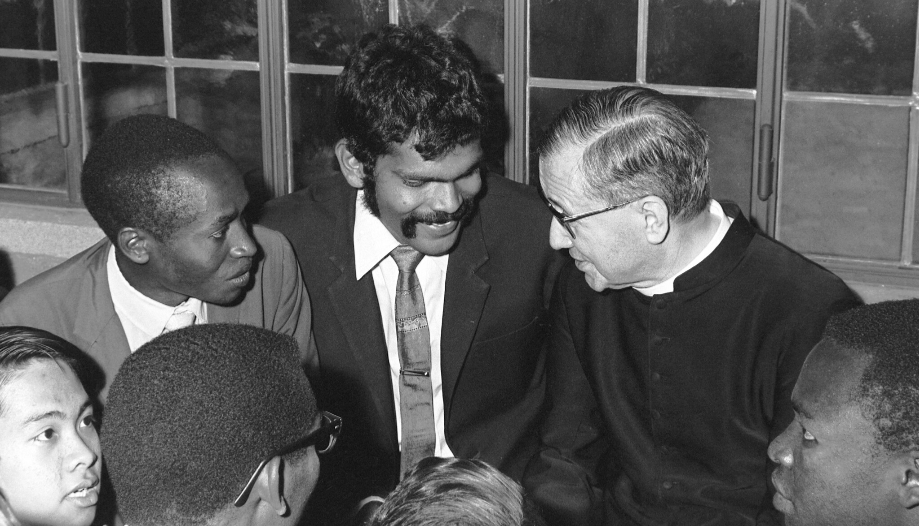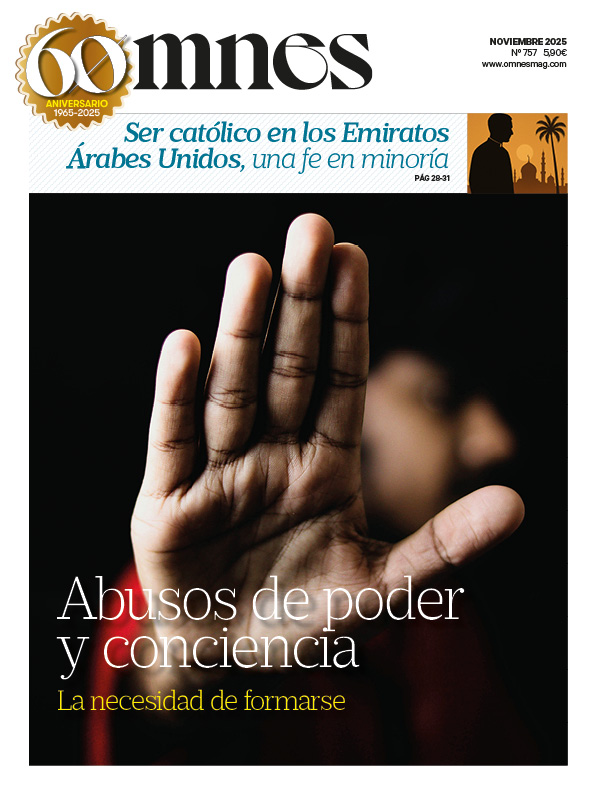–Text: Pedro Rodríguez: Founder and first editor of Palabra magazine
I was the director of Palabra since its origin (1965), but in January 1967 I left Spain and I was in Rome, Belgium, Switzerland and Germany until the end of June 1967. In the plan of the small "little council" for the preparation of the future Faculty of Theology of the University of Navarra (Alfredo García, José María Casciaro and Pedro Rodríguez), I was to dedicate myself fully to the projected Faculty which, in the form of a Theological Institute, would begin in October of that year. The trip was planned in relation to this project: to inform about our future Faculty in Universities and ecumenical environments. In my absence, the assistant director of the magazine, Mr. Carlos Escartín, who would remain as director when I moved to Pamplona, substituted me at the head of Palabra.
During my absence from Europe, but shortly before my return, according to Carlos E., an old dream we had in Palabra was revived in conversation with Manuel Arteche: to do an interview with St. Josemaría Escrivá. Manolo A. said that it might be the right moment and Carlos E. formally made the request and processed it through the Regional Commission of the Opus Dei in Spain.
I returned to Madrid on June 28 of that year and immediately reconnected with the magazine of which I was editor, but very conscious that this would no longer be my main work, nor could it be, since I would devote myself full time to the University of Navarra. When I arrived in Madrid, I helped Alfredo García Suárez and Pepe Casciaro in the complex operation of our transfer to Pamplona, since in October I would begin the first year of my degree course.
In mid-July Emilio Navarro called the editor of the magazine to say, on behalf of Manuel Arteche, that Father (that's what we called St. Josemaría) had accepted and that, in principle, he was willing to give an interview to Palabra. I was not in the editorial office that day. Emilio was answered by Carlos, who told me right away and I called Manolo Arteche, who was the Spiritual Director of the Spanish Region: there was indeed a positive response from Rome about the interview, indicating that the magazine would send Father a questionnaire of 18 questions.
We worked hard to prepare them and I believe that in two or three days it was finished. We worked in Hermosilla 22, then the editorial office of the magazine, in that nice meeting room and editorial gatherings that we had there. The four of us from the management team were there: Carlos Escartín, Alberto García Ruiz (Alberto recently told me about those sessions), Gonzalo Lobo and myself.
Word was then a magazine of priestly content, formally addressed to the clergy. The criterion that guided us in the elaboration of the questionnaire was this: in the present situation of the Church, of the Work and of the application of the Council, what is it that - thinking of our readers - is of interest to ask Father? In what things, principally, do we need and need his guidance and magisterium?
We discussed it a lot until we arrived at the formulation of the questions that seemed appropriate to us. Thus we came up with not 18, but 21 questions, which we kept. We typed up the questionnaire and sent it to the Regional Commission so that they could send it to Father. Manolo Arteche contributes a very interesting fact: from the Commission they sent the questionnaire to Rome just as it was, without changing a comma and without including any draft or outline of answers of any kind, which they had not asked for. Therefore, the answers were all elaborated in Rome.
Summer 1967 and the answers
On August 4, we left for Pamplona, together with José Morales, Alfredo García, Pepe Casciaro, for a ten-day stay dedicated to the preparation of the initial academic course of the Theological Institute, with the idea of returning to Madrid once it was over. Carlos and Gonzalo remained in Madrid for the magazine.
Our session in Pamplona lasted 12 days and took place in a Center of the Work on Carlos III Street: about 12 teachers gathered there. On the 15th, at the end of the "conclave", there was a change of plans and I, instead of returning to Madrid, went with Alfredo to Islabe, near Bilbao, for the annual formation course from August 16 to September 11. At the end of the Course, Alfredo returned to Pamplona and I went to Madrid to organize my formal and definitive transfer to Pamplona, where I arrived on September 17.
Father had spent the summer in Italy and arrived in Spain through the Irun border. Florencio Sánchez Bella, César Ortiz and some other members of the Commission were waiting for him. On September 13 he arrived in Elorrio, in Vizcaya, where he stayed for a week. Rafael Camaño, who was one of those who was there with Father, returned to Madrid on the 18th taking with him - according to the diary of the Center on Diego de León Street - the sheets of paper with Father's answers to the questionnaire we sent him. Interesting is the entry in the diary (September 18, 1967): "We have received the interviews with Father that will be published in the magazine Palabra and in Gaceta Univ.
These documents are very important and shed a clear light on current problems such as the 'aggiornamento', the laity, the work of priests, their freedom of association, etc. In the afternoon Cesar called from Islabe to give some indications. It is very likely that Father will come to Madrid this week".
He answered all the questions except the last one, number 21, which he judged inappropriate (we were asking him about the most urgent concerns of Paul VI. An autographed remark of Father - according to what Manolo A. told me - pointed out that it was not correct to speak about what the Pope says to one in private audience). I was in Pamplona, as I said, when Father's reply arrived.
Mock-up and final details
The interview, which arrived in Madrid, as we saw, on September 18, immediately, against the clock, began to be laid out. I made a quick trip from Pamplona to Madrid at the end of September to see how the presentation and layout of the magazine was going, a trip that Gonzalo Lobo, who was in charge of the layout, remembers very well. But I quickly returned to Pamplona. Carlos Escartín and Gonzalo Lobo were, in fact, in charge of the whole operation of printing the October 1967 issue of Palabra, in which the interview was to be included.
There is an interesting anecdote. Carlos -that was what we had agreed- was the one who signed the "entradilla" or introduction of the interview, which was written in the editorial office. However, when Palabra de octubre came out, it was signed by me. Carlos recalls that, when he came to Pamplona for the October events (the issue of Palabra had just appeared and thousands of offprints of the interview were made), I told him how surprised I was to see myself signing that text, which I had not written. He gave me this reason: that he had been asked for it by the Regional Commission, telling him that it was logical that the interview with Father should appear signed by the director of the magazine.
A few months ago we informed our readers that, overcoming the resistance of Bishop Escrivá de Balaguer, a book will soon be published containing a selection of some of his writings (cf. Palabra, 21 [1967] 11). While the book is on the street, we would like to make available to all those who read it these reflections with which the Founder of Opus Dei responded to our brief questionnaire.
The current life of the Church, the horizons that are opening up for pastoral work, the reality of the laity and Christian life, the demands of freedom and the dignity of the human person, the renewal of the ecclesial task, the ecclesiological transcendence of Opus Dei, are the themes on which we have focused this interview. These pages, the only ones of their kind to date, reveal the supernatural desires and concerns of the Founder of Opus Dei, desires, concerns and realities of faithful service to Jesus Christ and his one Church, to all Christians and to all men and women of good will.
We can only express our joy at being able to publish these pages, which respond to a desire we have had for a long time. We would also like to thank Bishop Josemaría Escrivá for the breadth, clarity and frankness with which he has treated us. In doing so, we would also like to add our gratitude and our affection, which do not find easy expression in these brief lines. Pedro Rodriguez." In any case, the surprising reference in it - in the entradilla - to the "immediate book" of our Father - which never appeared - leads me to think that there were hands other than those of Alfredo García or Manolo Arteche, but the latter does not remember).
The reference, by the way, is to an article I published in the June issue of the magazine, entitled Contribution to a theology of the organized apostolate. (Word 21 [1967] 9-15), which in a footnote includes this bold statement about a book of our Father's that I am completely unaware of. I wrote the article while I was in Louvain and sent it in March of that year. It is almost certain, because of the subject matter, that it must have been consulted in Rome (although I seem to remember that I sent it - from Switzerland - to the Spanish Commission). I think that this footnote (which is included in the entry) is an addition suggested in Rome. I do not remember anything, but it is unthinkable that I would have included it on my own. All this must be in the file of that article in the General Archives of the Prelature.
Included in the book Conversaciones
Father left Elorrio for Molinoviejo, the retreat house located in the province of Segovia, on Thursday 21, and stayed there until Sunday 24. From September 24 to October 5 he was in Lagasca, from where he left for Pamplona. Manolo recalls another anecdote. When the interview was already composed -it was composed very quickly-, Carlos Escartín gave him the sheets in case Father wanted to see them, and Manolo took them to Molinoviejo and showed them to our Father, who remarked the impropriety of the matter: "Why are you bringing them to me, so that I can correct them? That's what proofreaders are for....
The interview was carefully published with our Father on the cover of the issue (photo chosen by Gonzalo Lobo). It was sold by the thousands at the Pamplona events and is the first chapter in the immediate book -this one, yes- of Conversations with Monsignor Escrivá de Balaguer..








